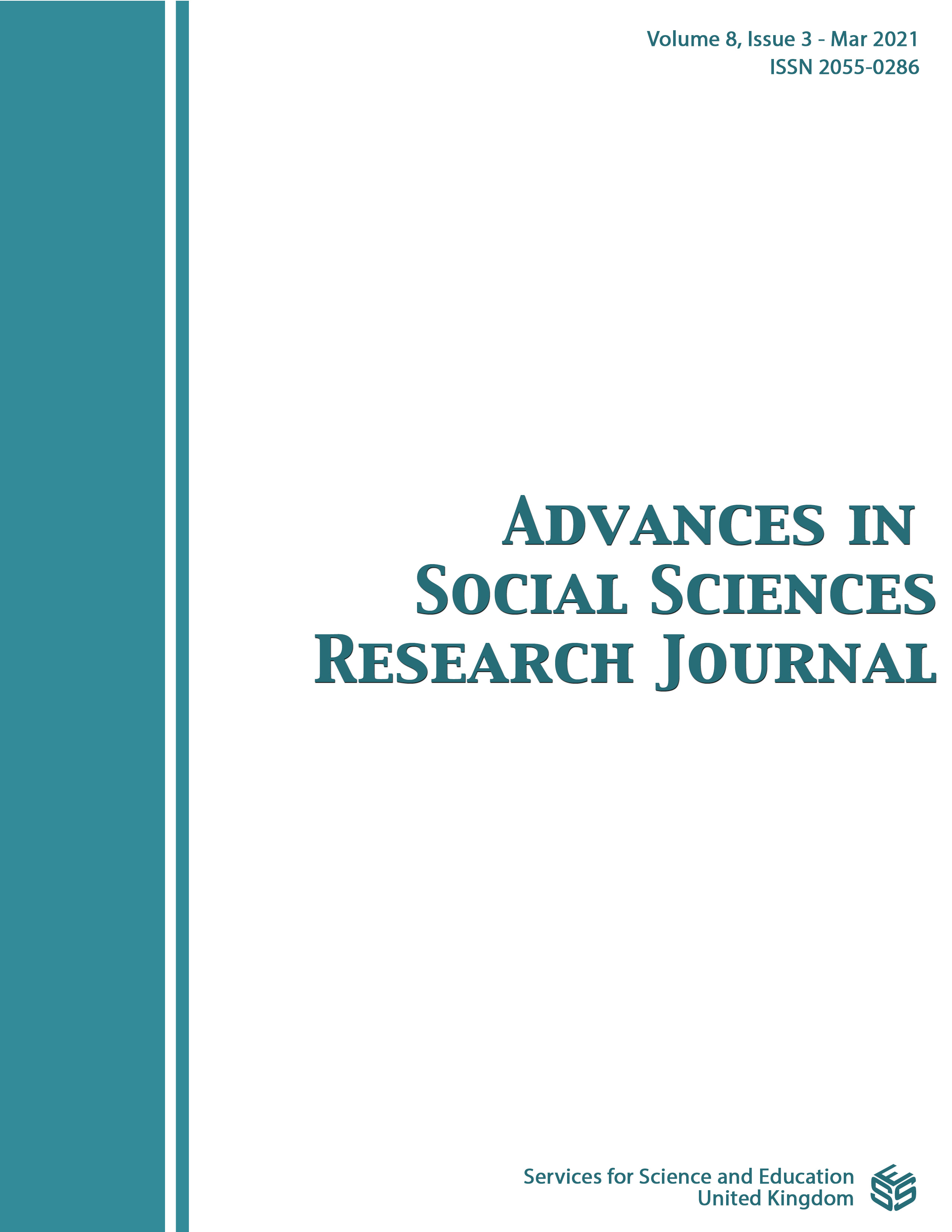Play in Early Childhood Education and the Perceived Impacts of Accountability and Rigor
DOI:
https://doi.org/10.14738/assrj.84.9846Keywords:
early childhood; play; high stakes accountability.Abstract
Exploring explored principals' and teachers' perceptions concerning the role of play in early childhood programs was this quantitative inquiry. All early childhood participants identified play as a learning tool but noted it was being eliminated from the curriculum due to high stake accountability. There was a significant difference between administrators and early childhood educators concerning the purpose of play. Implications for early childhood curriculum and school district policy were determined.
References
Bailey, B. (2011). Managing emotional mayhem: The five steps for self-regulation. Oviedo, FL: Loving Guidance, Inc.
Bassok, D., Latham, S., & Rorem, A. (2016). Is kindergarten the new first grade? AERA Open, 1(4), 1-31. DOI: 10.1177/2332858415616358
Bereiter, C. (1994). Constructivism, socioculturalism, and Popper's World 3. Educational Researcher, 23 (7), 21-23.
Brooks. J.G. and Brooks, M.G. (1993) In search of understanding: The case for constructivist classrooms. Alexandria, VA: American Society for Curriculum Development.
Brown, S., & Vaughan, C. (2010). Play: How it shapes the brain, opens the imagination, and invigorates the soul. New York, NY: Penguin Group.
Chaille, C. (2008). Constructivism across the curriculum in early childhood classrooms: Big ideas as inspiration. Boston, MA: Pearson Education, Inc. (pp. 1-5).
Conyers, M., & Wilson, D. (2015) Smart moves: Powering up the brain with physical activity. Phi Delta Kappan 9(8), 38-42.
Copple, C., & Bredekamp, S. (2009). Developmentally appropriate practice in early childhood programs. Washington, D.C.: National Association for the Education of Young Children. (pp. 1-50).
Creswell, J. W. (2015). Research design: Quantitative, qualitative, and mixed methods approaches (4th ed.). Thousand Oaks, CA: Sage.
Elkind, D. A. (2007). The power of play: Learning what comes naturally. Philadelphia, PA: Perseus Books Group.
Epstein, A. S. (2009). Me, you, us: Social-emotional learning in preschool. Ypsilanti, MI: HighScope Press. (pp. 13-21, 69-89, & 135-141).
Epstein, A. S. (2014). The intentional teacher: Choosing the best strategies for young children’s learning. Ypsilanti, MI: HighScope Press. (pp. 1-42).
Ethridge, E. A., & Branscomb, K. R. (2009). Learning through action: Parallel learning processes in children and adults. Teaching and Teacher Education, 25(3), 400-408. doi: 10.1016/j.tate.2008.09.004
Executive Office of the President. (2015). Every Student Succeeds Act: A progress report on elementary and secondaryeducation. retrieved fromhttps://www.whitehouse.gov/sites/whitehouse.gov/files/documents/ESSA_Progress_Report.pdf
Fraenkel, J. R., & Wallen, N. E. (2003). How to design and evaluate research in education. New York: McGraw-Hill.
Gagnon, S., Reichard, A. E., Kidder-Ashley, P., Griggs, M., Struby, J., & Bollinger, J. (2014). Help me play! Parental behaviors, child temperament, and preschool peer play. Journal of Child and Family Studies, 23(5), pp. 872-884. doi: 10.1007/s10826-013-9743-0
Gay, L.R. (1996). Educational research: Competencies for analysis and application. New Jersey: Prentice-Hall, Inc.
Haslip, M. J., & Gullo, D. F. (2018). The changing landscape of early childhood education: Implications for policy and practice. Early Childhood Education Journal, 46(3), 249-264.
Hirsh-Pasek, K., Golinkoff, R. M., Berk, L., & Singer, D. (2009). A mandate for playful learning in preschool: Presenting the evidence. New York: Oxford University Press
Horner, R. H., Todd, A. W., Lewis-Palmer, T., Irvin, L. K., Sugai, G., & Boland, J. B. (2004). The school-wide evaluation tool (SET): A research instrument for assessing school-wide positive behavior support. Journal of Positive Behavior Interventions, 6(1), 3-12.
Lisko, S. A., & O’Dell, V. (2010). Integration of theory and practice: Experiential learning theory and nursing education. Nursing Education Perspectives, 31(2), 106-108.
Madsen, J., Schroder, P., & Irby, B. J. (2014). Educational reform and leadership. Delta Kappa Gamma Bulletin, 80(4), pp. 23-28.
Mertens, D. M. (2010). Research and evaluation in education and psychology: Integrating diversity with quantitative, qualitative, and mixed methods. (3rd ed.). Los Angeles, CA: Sage.
Musfiroh, T. (2014). Teori dan konsep bermain. (Online), (http://repository.ut.ac.id/4699/1/PAUD4201-M1.pdf, diakses tanggal 30 January 2019).
Olusegun, S. (2015) Constructivism learning theory: A paradigm for teaching and learning Journal of Research & Method in Education 5(1), pp 66-70 DOI: 10.9790/7388-05616670
Piaget, J. (1929). The child's conception of the world. NY: Harcourt, Brace Jovanovich.
Rivera, M. (2009). The powerful effect of play in a child’s education. The Education Digest, 75(2), 50-52.
Tobin, J. (2013). The disappearance of the body in early childhood education. In L. Bresler (Ed.), Knowing bodies, moving minds: Towards embodied teaching and learning (pp. 111–126). New York, NY: Springer.
Van Oers, B., & Duijkers, D. (2013). Teaching in a play-based curriculum: Theory, practice and evidence of developmental education for young children. Journal of Curriculum Studies, 45(4), 511-534. doi: 10.1080/00220272.2011.637182
Wainwright, N., Goodway, J., Whitehead, M., Williams, A., & Kirk, D. (2019): Playful pedagogy for deeper learning: exploring the implementation of the play-based foundation phase in Wales, Early Child Development and Care, DOI: 10.1080/03004430.2019.1653551 To link to this article: https://doi.org/10.1080/03004430.2019.1653551
Weisberg, D. S., Kittredge, A. K., Hirsh-Pasek, K., Golinkoff, R. M.., & Klahr, D. (2015). Making play work for education. Phi Delta Kappan 96(8), 8-13.
Xu Z. & Shi, Y. (2018) Application of constructivist theory in flipped classroom: Take college English teaching as a case study Theory and Practice in Language Studies 8(7), pp. 880-887, DOI: http://dx.doi.org/10.17507/tpls.0807.21
Downloads
Published
How to Cite
Issue
Section
License
Authors wishing to include figures, tables, or text passages that have already been published elsewhere are required to obtain permission from the copyright owner(s) for both the print and online format and to include evidence that such permission has been granted when submitting their papers. Any material received without such evidence will be assumed to originate from the authors.






